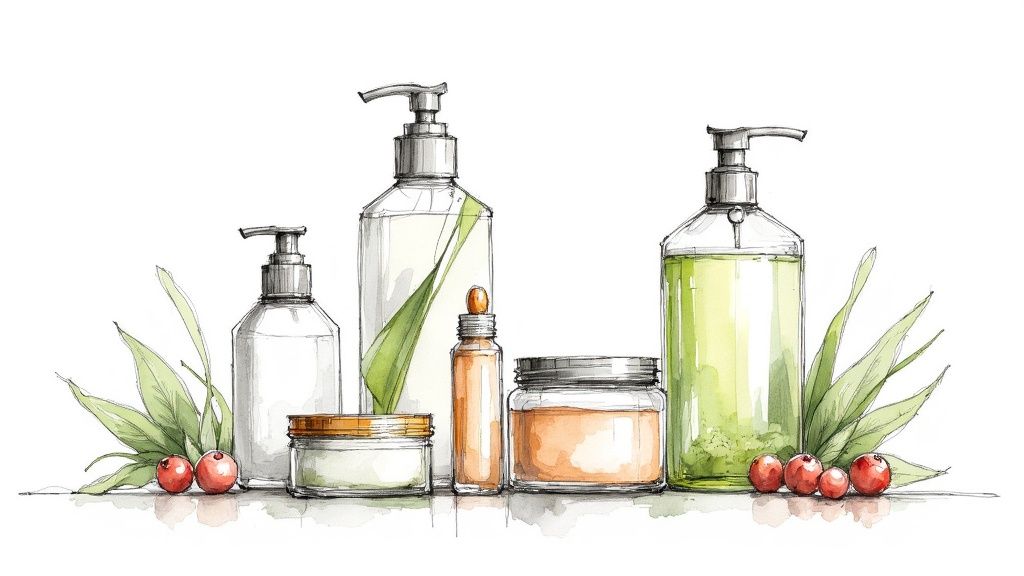Understanding Your Skin’s Transformation During Pregnancy

Your skin goes through remarkable changes during pregnancy, alongside the many other ways your body adapts to nurture your growing baby. As your hormone levels shift and blood volume increases, you may notice various skin changes – some you’ll love, and others you might find challenging. Creating a good skincare routine now will help keep your skin healthy throughout your pregnancy journey.
The Science Behind the Glow (and Other Changes)
Your body produces up to 50% more blood during pregnancy to support your baby’s growth. This increased circulation gives many women that famous “pregnancy glow” – a natural flush that makes skin look fresh and rosy. Your hormones are also working overtime, which can make your skin more oily or dry than usual. For instance, higher estrogen levels boost melanin production, causing some areas of skin like your face, nipples, and areolas to darken. Don’t worry – this is completely normal and happens to many pregnant women.
These hormone changes affect everyone differently. You might get breakouts, even if you’ve always had clear skin before. Or your usually oily skin might become dry and sensitive. Since everyone’s experience is unique, it’s important to adjust your skincare routine based on how your skin responds during pregnancy.
Common Skin Changes During Pregnancy
Knowing what skin changes to expect helps you handle them with confidence. Here are the most common changes you might see:
- Melasma (Chloasma): Also called the “mask of pregnancy,” these dark patches typically show up on your forehead, cheeks, and upper lip. About 70% of pregnant women develop melasma, which happens when their skin makes extra melanin, especially after sun exposure. About 90% of pregnant women notice at least one major skin change, with melasma being among the most common.
- Acne: Those hormone surges in early pregnancy can make your oil glands more active, leading to more breakouts in the first and second trimesters.
- Stretch Marks: As your belly grows, you might notice reddish or purplish lines developing on your stomach, breasts, thighs, and bottom where your skin stretches to accommodate your changing shape.
- Skin Tags: These harmless little skin growths often pop up during pregnancy, usually around your neck, underarms, and groin area.
- Dryness and Itching: Your changing hormones and increased blood flow can leave your skin feeling dry and itchy, particularly across your growing belly.
While this covers the main changes you might experience, every pregnancy is different. Some women notice all of these changes, while others only experience a few. Up next, we’ll look at how to choose safe and effective skincare products that work for your changing skin during pregnancy.
Navigating Safe and Effective Ingredients

Pregnancy brings major changes to your skin due to shifting hormones. This makes it extra important to choose skincare products carefully, both for your skin’s health and your baby’s safety. Let’s look at which ingredients you can trust and which ones to avoid during these nine months.
Decoding Product Labels: What to Look For and What to Avoid
Reading skincare labels shouldn’t feel overwhelming. Here are the key ingredients to watch out for during pregnancy:
- Retinoids (Vitamin A Derivatives): Skip products with retinol, tretinoin, and isotretinoin, as these anti-aging ingredients have been linked to birth defects.
- Salicylic Acid (High Concentrations): While spot treatments with small amounts are usually fine, avoid peels or oral medications with high concentrations.
- Hydroquinone: This skin-brightening ingredient can enter your bloodstream, so it’s best to avoid it while pregnant.
The good news? You still have plenty of safe, effective options to keep your skin healthy:
- Hyaluronic Acid: This natural substance helps your skin stay hydrated and plump by drawing in moisture.
- Glycolic Acid (Low Concentrations): Used in small amounts and cleared by your doctor, this can gently exfoliate and help with uneven skin tone.
- Niacinamide (Vitamin B3): Perfect for calming irritated skin and managing breakouts without harsh chemicals.
- Azelaic Acid: This gentle ingredient fights bacteria and inflammation while being safe for pregnancy.
Building a Safe and Effective Pregnancy Skincare Routine
Now that you know which ingredients work best, let’s create a simple routine that’s both safe and effective. When your skin is extra sensitive during pregnancy, less is often more.
- Cleanse: Pick a mild, unscented cleanser that removes dirt without drying out your skin.
- Hydrate: Use products with hyaluronic acid to keep your skin moisturized throughout the day.
- Treat (If Needed): For specific concerns like acne or dark spots, talk to your doctor about using safe options like azelaic acid or niacinamide.
- Protect: Since pregnancy can make your skin more prone to dark patches, wear a mineral sunscreen with zinc oxide or titanium dioxide every day.
Taking care of your skin during pregnancy doesn’t have to be complicated. By choosing the right ingredients and keeping your routine simple, you can maintain healthy skin while keeping your baby safe. Next, we’ll explore how to build an effective morning skincare routine specifically for pregnancy.
Crafting Your Morning Protection Protocol
Creating a thoughtful morning skincare routine during pregnancy helps keep your skin healthy while addressing its unique needs. During these nine months, your skin requires extra care and protection from daily environmental factors, with special attention to hydration and sun protection.
Hydration: The Foundation of Healthy Skin
Start your day with a gentle, fragrance-free cleanser to remove overnight buildup while preserving your skin’s natural moisture barrier. Next, apply a hydrating serum containing hyaluronic acid, which works like a moisture magnet to keep your skin plump and hydrated. This step becomes especially important during pregnancy since increased blood volume means your skin needs more hydration than usual. Pay attention to how your skin feels – if it’s tight or itchy after cleansing, that’s a clear sign to boost hydration.
Targeted Treatments for Specific Concerns
For pregnancy-related skin challenges like acne or dark spots, certain targeted treatments can help. Azelaic acid helps manage oil and reduce inflammation, while niacinamide brightens and smooths skin texture. Make sure to check with your doctor before adding any new treatments to your routine, especially if you have existing skin conditions that need special attention.
Sun Protection: Your Shield Against Damage
The most essential step in your morning routine is sun protection. Pregnancy hormones make your skin more likely to develop melasma (dark patches also known as the “mask of pregnancy”). That’s why using a broad-spectrum mineral sunscreen every day is crucial. Mineral sunscreens with zinc oxide and titanium dioxide create a physical barrier on your skin, reflecting harmful UV rays away. Unlike chemical sunscreens that absorb UV rays, mineral options are considered pregnancy-safe. Choose SPF 30 or higher and apply generously to all exposed areas, even on cloudy days. For extra protection, wear a wide-brimmed hat when outdoors.
Building Your Personalized Routine
While these guidelines provide a good starting point, your ideal pregnancy skincare routine should match your specific needs. Consider your skin type, concerns, and daily schedule when choosing products. If you have oily skin, you might prefer lighter moisturizing formulas. If you’re often rushed in the morning, look for products that combine multiple benefits, like moisturizers with built-in sun protection. Find what works best for you and stick with it – consistency is key for maintaining healthy skin throughout your pregnancy.
Mastering Your Evening Repair Strategy

While you sleep, your skin goes into active repair mode, making your nighttime skincare routine especially important during pregnancy. The natural changes happening in your body – from hormone shifts to increased blood flow – directly affect how your skin repairs and regenerates itself. That’s why having a thoughtful evening skincare routine can help maintain healthy skin throughout your pregnancy journey.
Gentle Cleansing and Makeup Removal
Start your nighttime routine by thoroughly but gently cleansing your face. Since pregnancy often makes skin more sensitive, choose a mild cleanser without added fragrances to remove makeup, dirt, and oil without drying out your skin. A gentle micellar water or cleansing balm works well for taking off stubborn makeup while being kind to sensitive skin. Getting your skin completely clean creates the perfect foundation for the rest of your evening routine.
Hydrating and Nourishing Your Skin
After cleansing, focus on adding moisture and nutrients back into your skin. One excellent ingredient to look for is hyaluronic acid, which helps keep skin plump and hydrated by drawing in moisture. You’ll also want to use a pregnancy-safe moisturizer containing antioxidants that protect and support your skin’s natural repair processes. This step is especially valuable since about 90% of women notice skin changes during pregnancy that benefit from extra nourishment and care.
Addressing Specific Skin Concerns
Pregnancy can trigger or worsen certain skin issues like breakouts or dark spots. Your evening routine is the perfect time to target these concerns with specific treatments. For instance, azelaic acid effectively helps manage acne and reduces inflammation, while niacinamide can help even out skin tone and minimize dark spots. Just be sure to check with your doctor before trying new products, particularly if you have existing skin conditions. They can recommend the safest options for your needs.
Optimizing Your Overnight Recovery
End your routine with a light facial oil to lock in moisture and boost overnight skin repair. Good pregnancy-safe choices include rosehip or jojoba oil, which provides essential fatty acids and antioxidants. This final protective layer helps your skin get the most benefit from your entire routine so you wake up with refreshed, healthy-looking skin. Remember that doing your evening routine consistently, with products chosen specifically for pregnancy, helps support your skin’s natural repair process during this special time.
Hydration and Nutrition: Your Internal Skincare Allies
When it comes to achieving that enviable pregnancy glow, what you put into your body matters just as much as what you put on it. While your skincare products work from the outside, staying well-hydrated and eating the right foods supports your skin from within, especially as your body goes through incredible changes during pregnancy.
The Power of Hydration for Skin Elasticity
Your skin cells need water to stay plump and healthy – much like grapes that shrivel when dried out. Getting enough water is extra important during pregnancy since your blood volume increases significantly. Without proper hydration, you might notice your skin becoming dry and itchy, making common pregnancy skin issues feel worse. That’s why drinking at least three liters of water daily can make such a big difference in how your skin looks and feels. For instance, many moms find it helpful to keep a marked water bottle nearby and set gentle reminders on their phones to sip throughout the day. This simple habit can help your skin stay elastic and better adapt to your growing belly.
Essential Nutrients for a Healthy Pregnancy Glow
The foods you eat don’t just nourish your growing baby – they also give your skin what it needs to stay healthy and radiant. For example, Vitamin C from citrus fruits, berries, and leafy greens helps your body make collagen, which keeps skin firm and elastic. Your skin also loves healthy fats, like those in avocados and nuts, which help lock in moisture and protect against everyday environmental stress. These nutrients work together with your regular skincare routine to keep your skin looking its best.
Building a Nourishing Meal Plan
Making skin-friendly food choices doesn’t have to be complicated or time-consuming. Start your day with yogurt topped with antioxidant-rich berries and a sprinkle of nuts. For lunch, try a colorful salad with creamy avocado and protein-packed grilled chicken. End your day with omega-3-rich baked salmon and roasted vegetables to give your skin everything it needs to repair and refresh overnight. Small changes like these can make a big difference in how your skin looks and feels throughout your pregnancy. When you focus on nourishing your body from within, you’re not just supporting your baby’s growth – you’re also helping your skin stay healthy and radiant during this special time.
Addressing Pregnancy-Specific Skin Concerns

Pregnancy brings many changes to your skin, from dark patches to breakouts. Let’s explore practical ways to care for these common concerns while keeping both you and your baby safe. With some simple adjustments to your skincare routine, you can help your skin stay healthy throughout your pregnancy journey.
Managing Melasma (The Mask of Pregnancy)
Up to 70% of pregnant women experience melasma, those distinctive dark patches that appear on the face during pregnancy. These spots show up because pregnancy hormones, especially estrogen, boost your skin’s melanin production. The good news is that you can help prevent and minimize melasma’s appearance. Your best defense is a good mineral sunscreen with SPF 30 or higher that contains zinc oxide or titanium dioxide – apply it every single day, even when it’s cloudy. A wide-brimmed hat adds extra protection when you’re outside. If the dark patches bother you, talk to your doctor about using azelaic acid, a pregnancy-safe ingredient that can help even out your skin tone.
Combating Pregnancy Acne
Those same pregnancy hormones that cause melasma can also trigger acne breakouts by ramping up oil production in your skin. While you might be tempted to use strong acne treatments, many aren’t safe during pregnancy. Instead, stick to gentle cleansing – washing too often can make breakouts worse by stripping your skin’s natural oils. Products with niacinamide can help control oil and calm inflammation without harsh ingredients. For occasional spots, your doctor might be okay with using products with low amounts of salicylic acid (less than 2%). Keep in mind that every mom-to-be’s skin responds differently, so you may need to try different approaches to find what works for you.
Minimizing Stretch Marks
As your baby grows, your skin stretches to make room, sometimes creating those familiar reddish or purple lines known as stretch marks. While your genes play a big part in whether you’ll get them, keeping your skin well-moisturized might help reduce their appearance. Make it a daily habit to moisturize your belly, breasts, thighs, and buttocks with rich creams or oils. Look for products containing hyaluronic acid or cocoa butter – these ingredients help keep skin supple and better able to stretch as your body changes. Think of it like caring for a rubber band – when it’s well-moisturized, it stretches more easily without breaking.
Soothing Dry and Itchy Skin
Many pregnant women deal with dry, itchy skin, especially as their belly grows. Between hormonal changes and stretching skin, the discomfort can be real. The solution starts with good hydration – both inside and out. Choose skincare products with hyaluronic acid to draw moisture into your skin, and ceramides to strengthen its natural barrier. A gentle, unscented body lotion or oil can help lock in moisture and calm irritation. Simple changes like taking shorter, cooler showers and running a humidifier can make a big difference too. Remember to drink plenty of water throughout the day to keep your skin hydrated from within.
Pregnancy brings plenty of changes, and your skin needs extra care during this special time. By understanding these common concerns and using safe, effective solutions, you can help your skin stay comfortable and healthy while you focus on growing your little one.
Looking for more support during your pregnancy journey? Check out Pregnancy 101, where you’ll find expert guidance and a community of Indian moms-to-be just like you. Join us to learn more about caring for yourself and your baby during this special time.
